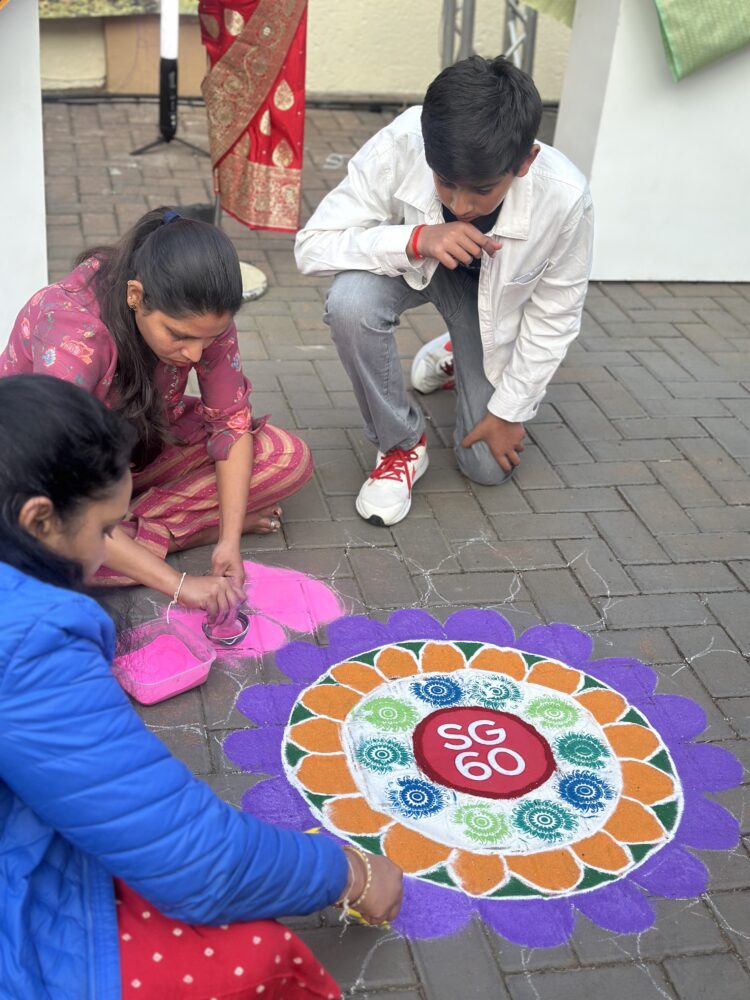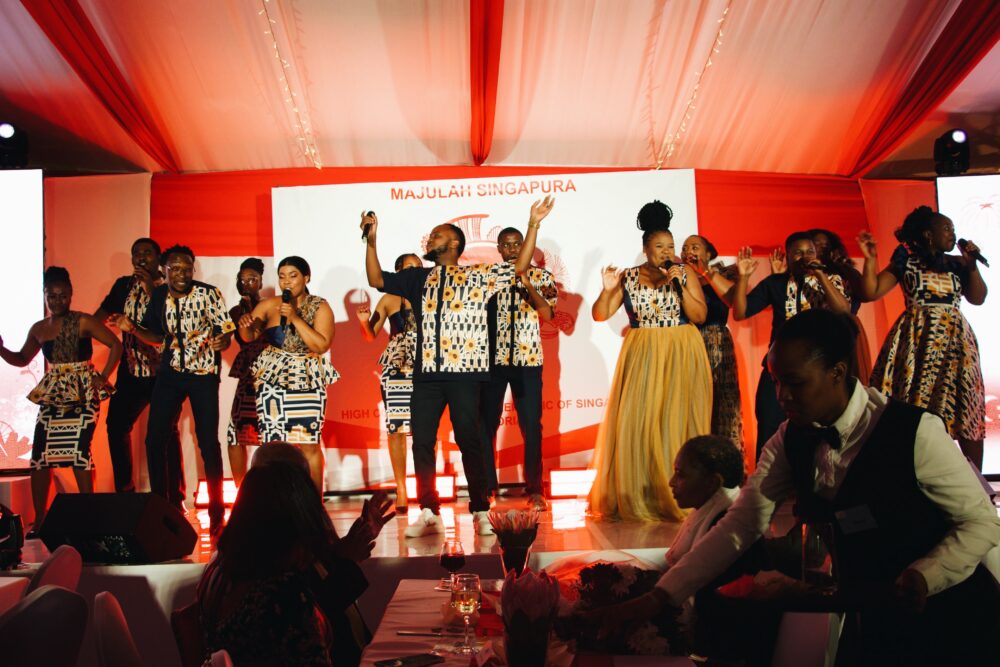Festivities: Guests at the Singapore event hung messages for the island nation. (Photos: Claudia Teo, @claudiawillowphoto and Marion Smith)
Singapore’s high commission in Pretoria pulled out all the stops last week to mark the island nation’s 60th anniversary of independence, hosting an elaborate reception that served as both cultural celebration and diplomatic statement.
The 14 August event, commemorating what Singaporeans call SG60, drew 300 guests including senior government ministers, business leaders and diplomatic corps representatives from across the region.
The timing carried special significance, coinciding with South Africa’s National Women’s Day. High commissioner Zainal Arif Mantaha acknowledged this convergence in his address, invoking the Women’s Day slogan “You strike a woman, you strike a rock” as tribute to South African women’s courage and resilience.
Among the distinguished guests were the minister in the presidency for planning, monitoring and evaluation, Maropene Ramokgopa, the former international relations minister, Naledi Pandor, and the former public service and administration minister, Geraldine Fraser-Moleketi. ActionSA leader Herman Mashaba and several Tshwane councillors also joined the gathering, reflecting the strong bilateral relationships built over three decades of cooperation.
The evening’s centrepiece was the transformation of the high commission’s BabaHouse@ZA annex into an authentic Singapore hawker centre. Colourful food stalls recreated the atmosphere of the nation’s famous street food markets, complete with communal benches where guests sat side by side sampling iconic dishes.
The menu read like a tour of Singapore’s multicultural heritage: Hainanese chicken rice, yong tau foo, laksa noodles, fried kway teow, chicken and tempeh satay, and beef rendang. The meal concluded with traditional sweets including sugee cake, tau huay, ondeh-ondeh, and kueh lapis. This gastronomic experience honoured Singapore’s hawker culture, recently recognised by the United Nations Educational, Scientific and Cultural Organisation.
The cultural showcase extended beyond food to displays representing Singapore’s major ethnic communities. Chinese artefacts linked to the Hungry Ghost Festival, Malay baju kurung and congkak, Indian Rangoli displays with sarees and ghee lamps, and Peranakan kasut manik, kebaya and kerongsang demonstrated the nation’s diversity.
Wall displays featured Singapore’s renowned “orchid diplomacy” tradition of naming hybrid orchids after visiting foreign dignitaries. Pride of place went to the Sealara Nelson Mandela orchid, created during his 1997 state visit to Singapore.
The evening marked several firsts in diplomatic protocol. For the first time, an imbongi performed at a foreign embassy event in Pretoria. MoAfrika wa Mokgathi delivered a specially commissioned recital chronicling Singapore’s history in the traditional praise-singing style.
 Guests decorated the SG60 celebration sign
Guests decorated the SG60 celebration sign
The Tshwane Gospel Choir provided yet another memorable moment, performing Singaporean National Day standards including Home, Stand Up for Singapore and Here We Are. Their renditions bridged two nations through
the universal language of music.
Guests contributed to a red and white “wishing tree,” hanging birthday messages for Singapore on cards matching the nation’s flag colours.
Beyond the cultural festivities, the reception served as a platform for reinforcing substantial economic ties between the two nations. High commissioner Mantaha emphasised that South Africa represents Singapore’s most important economic partner on the African continent, while Singapore stands as South Africa’s largest trading partner within the Association of Southeast Asian Nations.
The statistics paint a picture of robust cooperation. Singapore has invested more than R5 billion in South Africa in the manufacturing, financial services and real estate sectors. South Africa exports gold, diamonds and wine to Singapore, receiving electronics, chemicals and machinery in return.
“Singapore serves as an important gateway for South African goods and services entering Southeast Asia, while also providing a strategic base for South African businesses expanding across the region,” Mantaha said.
The high commissioner used the occasion to advocate for a free trade agreement between Singapore and the Southern African Customs Union, currently chaired by South Africa. Such an agreement could enhance market access and deepen economic cooperation across both regions.
Mantaha highlighted Singapore’s support for South Africa’s G20 presidency priorities, noting Singapore’s invitation as a guest country. Prime Minister Lawrence Wong is expected to make his first visit to South Africa for November’s G20 Summit, further cementing bilateral engagement.
 The Tshwane Gospel Choir performed classic Singaporean songs for the 60th anniversary event.
The Tshwane Gospel Choir performed classic Singaporean songs for the 60th anniversary event.
The high commissioner drew interesting parallels between both nations’ approaches to national consensus-building. He referenced Singapore’s “Forward Singapore” exercise, launched by Wong in June 2022, comparing it to South Africa’s National Dialogue initiative launched the day after the reception.
“Like previous exercises, the outcomes of Forward Singapore led directly to policy commitments,” Mantaha said, suggesting shared approaches to democratic consultation despite different political systems.
In an acknowledgment of South-South cooperation, Mantaha spoke of Singapore’s willingness to learn from African innovation. He said Singapore had benchmarked itself against Kenya’s economic and institutional models and Namibia’s pioneering water recycling efforts.
“Today, Singapore continues to be inspired by how African countries are harnessing fintech, including South Africa, to leapfrog stages of development,” he said.
A slideshow of 60 years of Singapore-Africa diplomatic contacts was presented.
Ramokgopa responded by highlighting that the relationship between the two countries was founded in “mutual respect and shared aspirations”. She said cooperation extended beyond economics to “education, science and technology, skills development and public sector reform”.
The minister emphasised shared multilateral objectives: “As partners in the G20, we share common goals of ensuring the global economic order becomes more inclusive, more just and more responsive to developing countries’ needs.
“As South Africans, we consider Singapore a valued friend and partner. Let us continue building bridges between our peoples, strengthening collaboration between our institutions and working together to address contemporary challenges with shared resolve and shared hope.”
The evening represented more than ceremonial diplomacy. It showcased how middle powers can leverage cultural understanding to strengthen economic and political cooperation. Singapore’s approach of combining authentic cultural expression with serious policy discussion offers a template for effective diplomatic engagement.
The reception’s success reflected careful attention to detail and genuine respect for both cultures.
As both nations navigate complex global problems, from economic uncertainty to climate change, the Singapore high commission’s SG60 celebration illustrated how shared values and mutual learning can sustain partnerships across continents. The evening captured not just 60 years of Singaporean independence, but the enduring potential for cooperation between nations committed to pragmatic problem-solving and inclusive development.
This partnership, anchored in mutual respect and forward-looking collaboration, positions both countries to address future challenges while celebrating the diversity that strengthens their bilateral bond.